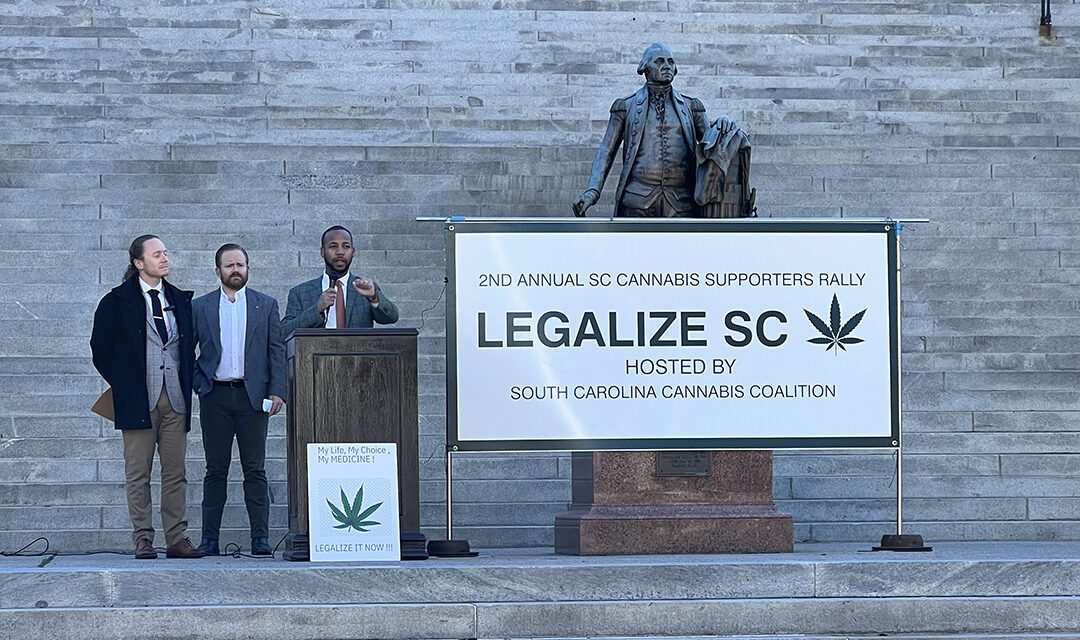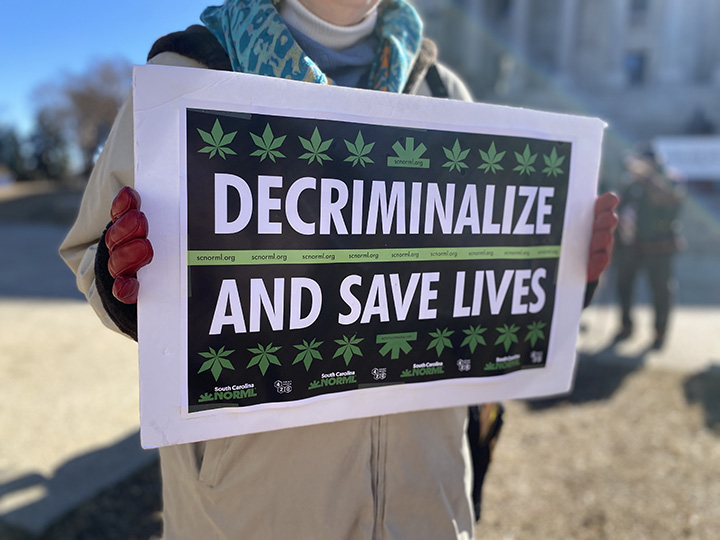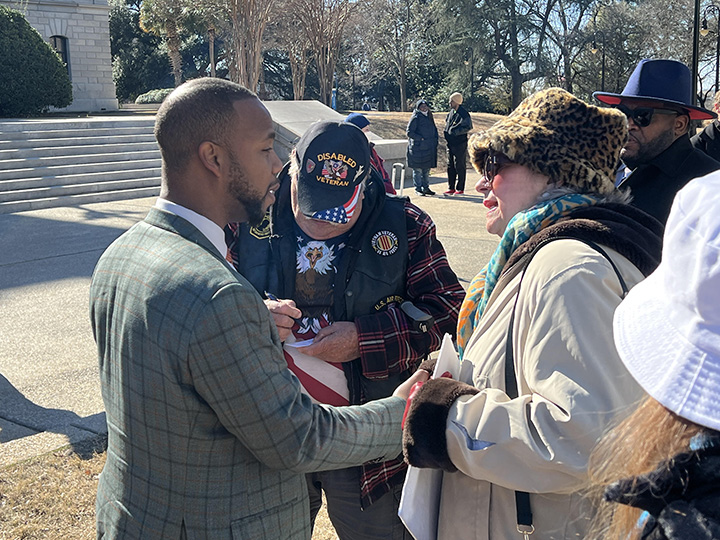Sen. Deon Tedder, D-Charleston, speaks to the crowd at the second annual “South Carolina Cannabis Supporters United” rally hosted by the S.C. Cannabis Coalition on Jan. 17. (Photo by Riley Edenbeck/Carolina News and Reporter)
A proposed law would prevent South Carolina law enforcement from using the smell of marijuana as a reason to search a car or pedestrian.
But law enforcement agencies are concerned the legislation will keep officers from doing their jobs by removing smell as reasonable grounds for performing a search.
State Sen. Deon Tedder, D-Charleston, who pre-filed the bill, said he is concerned that officers’ ability to search cars based solely on smelling marijuana is perpetuating racial profiling.
“While not all officers do this, there are some that take advantage of this language to simply search a car, and it goes back to racial profiling,” Tedder said. “It’s not that you’re under the influence, it’s that, ‘You look like a criminal and I need to see what I can find to arrest you.”
Marijuana is illegal in South Carolina, despite years of back and forth in the House and Senate.
Tedder spoke at the second annual “South Carolina Cannabis Supporters United” rally hosted by the S.C. Cannabis Coalition on Jan. 17. The goal of the rally was to support the “sensible” decriminalization of marijuana, which would make marijuana possession a minor offense, according to attendees.
“The whole idea is, don’t put them into the court system,” Bob Chapman, founder and executive director of the Coalition said. “Just treat it like jaywalking.”
Tedder also used the reasoning that scent is subjective, and people’s perceptions of an environment may be different.
“I can stand right here and say I smell strawberries, and you may smell something different,” Tedder told the audience.
Hemp is legal in South Carolina, as are low doses of Delta-9 consumables.
Since hemp and marijuana are derived from the same plant and smell similar, the bill would also help prevent people from being searched due to the odor of legal products, Tedder said.
“You have people that can go and legally purchase a product, and now they’re subjected to an illegal stop, but they’re not breaking the law,” Tedder said. “Now that these things are becoming legal, there has to be some balance.”
Tedder announced at the event that he would be filing a companion bill requiring law enforcement to document when they search cars, but release the driver, based on the smell of marijuana. The companion bill has not yet been filed, but Tedder plans to have the bill drafted this week with someone in the House.
He wants law enforcement to collect data on the race and ethnicity of drivers pulled over and searched, and whether or not marijuana is found. Tedder said that having this data would help keep officers accountable and expose any trends.
But the companion bill would not be necessary if the original bill were to pass, Tedder said. It would be drafted for those who are pushing against the “no smell” bill. He said that if critics of the bill don’t believe there’s a profiling issue, but the original bill shouldn’t be passed, they should be fine with allowing that data to be collected.
“You can’t be against both,” Tedder said.
Some in law enforcement have expressed concern that the initial bill could incentivize people to store or smoke marijuana in their vehicles, Tedder said. But he said the bill’s language does not prevent police officers from being able to pull someone over that they think is under the influence if they have reasons other than the smell of marijuana. The bill instead aims to protect citizens’ 4th amendment right against unreasonable search and seizure.
John “JJ” Jones, the executive director of the South Carolina Law Enforcement Officers Association, is concerned about the impact the bill will have on law enforcement if it passes. He said the legislation could limit police officers’ ability to do their jobs.
“We have some serious concerns, that you would want to take any part of probable cause reasonable suspicion away from a police officer or sheriff’s deputy at work in the street against illegal drugs. Marijuana is still illegal in the state of South Carolina,” Jones said.
Tedder said his bill would help to protect law enforcement from discrimination lawsuits and altercations on the job with persons who are wrongly accused of possessing marijuana. The second bill is for transparency, which, Tedder said, is something law enforcement should want more of to build stronger trust in communities where it is typically lacking.
Tedder said the pushback from law enforcement makes it even more important to have the discussion. Especially after the same bill of Tedder’s didn’t go anywhere in a previous session when he was a member of the House, he’s pushing again by filing the companion bill and requesting a hearing from committee chairs where all stakeholders can give their testimony.
“If they can offer ways that they feel will improve the legislation, I’m all ears for that,” Tedder said.
Rally attendees included hemp farmers, some veterans and other supporters of medical marijuana legalization from across the state. Tedder is also advocating for the legalization of medical cannabis, which is to be discussed in this legislative session.
Chris Nulty, a member of the South Carolina Cannabis Coalition and South Carolina NORML, is an activist for the legalization of marijuana and participates in protests weekly in Greenville.
“It’s important for veterans, it’s important for pain management, it’s important for people that just like it in general,” Nulty said.
Wayne Borders, former president and executive director of Columbia NORML, attended the rally and said beforehand he encourages legislators to pay attention to their constituents’ voices.
“’Listen to the people in your community,’” Borders said he would tell lawmakers. “I would say, ‘You know, it’s time, quite frankly, to move into the 21st century.’”
Tedder’s bill is not yet on any agenda for discussion. But he said he is looking to get it assigned to a subcommittee as the Judiciary Committee begins meetings this week.
Tedder said he does expect backlash to the bill from fellow lawmakers. The House of Representatives for this session is made up of 88 Republican members and 35 Democrats, with one vacancy.
“I’ve received a lot of support from people in communities across the state since the news has been shining a spotlight on this legislation,” Tedder said. “Over 35 states have done this. We’re always last, and I think we have to do it for our people.”
An attendee at the second annual “South Carolina Cannabis Supporters United” rally hosted by the S.C. Cannabis Coalition holds a sign promoting the decriminalization of marijuana on Jan. 17. (Photo by Lauren Larsen/Carolina News and Reporter)
Sen. Deon Tedder, D-Charleston, speaks to a Vietnam veteran and supporter at the second annual “South Carolina Cannabis Supporters United” rally hosted by the S.C. Cannabis Coalition on Jan. 17. (Photo by Riley Edenbeck/Carolina News and Reporter)
ABOUT THE JOURNALISTS

Riley Edenbeck
Edenbeck is a senior journalism major at the University of South Carolina. She is a managing editor of USC’s student-run newspaper, The Daily Gamecock, where she has covered local news and culture for three years. She enjoys data, economic and business reporting, and she hopes to be a business journalist at a national publication.

Eva Flowe
Flowe is a junior multimedia journalism and education student at the University of South Carolina. She has worked as the student government beat writer and state and local government beat writer at the student-run publication, The Daily Gamecock. She freelances for The (Charleston) Post and Courier-affiliated Free Times in Columbia.

Lauren Larsen
Larsen is a junior journalism major from Rochester, New York, and manages social media for the University of South Carolina’s Admissions Student Council and for Barstool Sports’ SEC accounts. She has written several event-coverage and feature articles for the student-run Daily Gamecock. She was a digital desk intern during the summer of 2023 at The Buffalo News, where she copyedited articles and created storytelling videos.




